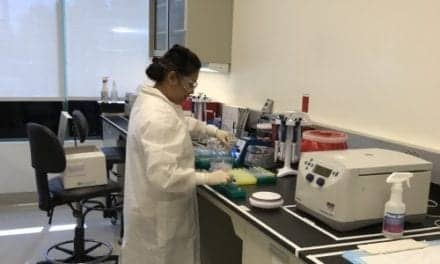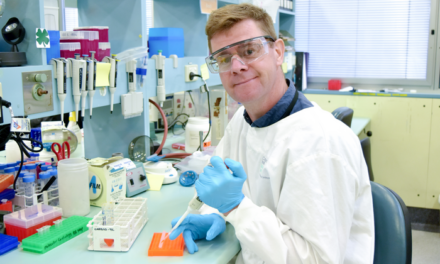NantHealth Inc, Culver City, Calif, has launched the Genomic Proteomic Spectrometry Cancer test, or GPS Cancer, a unique, comprehensive molecular test and decision support system that measures the proteins present in a patient’s tumor tissue, combined with whole genomic and transcriptomic sequencing of tumor and normal samples.
GPS Cancer integrates targeted quantitative proteomics with whole-genome (DNA) and whole-transcriptome (RNA) sequencing, and a knowledge database containing hundreds of oncogenes and approximately 1,500 cellular pathways to identify genomic and proteomic alterations—from DNA to RNA to protein. To inform personalized treatment strategies, the system targets proteins with high clinical relevance to each person’s tumor, providing oncologists with a detailed molecular profile of the patient’s cancer.
The system has the capability to quantify proteins that have known clinical significance relating to activity or resistance to chemotherapy, monoclonal antibody therapy (mAb), hormonal therapy, small molecule targeted therapy, and checkpoint inhibitors. Combined with whole-genome and transcriptomic analysis, the test provides informed clinical decision support, arming the physician with insight into the patient’s response and resistance to particular therapeutics before treatment begins. The information is available within 21 days of receipt of the tissue, thus enabling clinical utility.
Results are available to doctors in an easy-to-read report or accessible through the GPS Cancer Genome Browser, a mobile application available on smartphones. The app enables users to browse the patient’s whole genome down to a single base pair, and provides visual insight into genomic alterations along with relevant data about those alterations.
GPS Cancer testing is conducted in the CLIA-certified and CAP-accredited laboratory of NantOmics, Culver City, Calif, and is an enabler for the Cancer MoonShot 2020 cancer care collaborative.
“The ability to bring next-generation cancer treatments to patients marks a significant milestone in the war against cancer,” says Patrick Soon-Shiong, MD, founder and CEO of NantHealth. “While genomics has undoubtedly advanced our ability to treat cancer, gene panels have only given us a partial picture and only look at a fraction of the genome. We have leapfrogged from genomics to the era of clinically relevant proteomics with this comprehensive integration of DNA, RNA, and quantitative protein analysis in a single molecular test—GPS Cancer.
“Coupled with robust predictive analytics, this 21st century molecular profile offers clinicians and patients a powerful tool in fighting cancer at the point of care and before treatment begins,” Soon-Shiong says.
The test is an enabler for facilitating the goals of the Cancer MoonShot 2020, he adds. “GPS Cancer may accelerate efforts to bring novel combinations of therapeutic agents to cancer patients by providing the molecular fingerprinting foundation necessary to help identify patients eligible for quantitative integrative lifelong trials,” he adds. “These clinical trials, which are at the heart of Cancer MoonShot 2020, are aimed to accelerate the potential of immunotherapy as the new standard of care for cancer patients by harnessing the power of the immune system to fight this disease.”?
GPS Cancer sequences the whole genome of more than 20,000 genes and 3 billion base pairs, and matches them against the patient’s normal DNA, providing oncologists with an expansive view of alterations to inform personalized treatment strategies specific for that patient. GPS Cancer extends from genomics to proteomics not only through analysis of RNA but also provides quantitative proteomics through mass spectrometry to measure the amounts of clinically relevant proteins that are essential for various therapeutics. The clinically relevant information helps oncologists to better understand how patients may potentially respond to chemotherapies, targeted therapies, and immunotherapies.
”At Indiana University Health, we aim to identify innovative therapeutic options for metastatic cancer patients through the use of cutting-edge precision medicine technologies,” says Milan Radovich, PhD, codirector of the Indiana University Health Precision Genomics Program. “GPS Cancer, with its combination of genomic and proteomic profiling has revealed numerous opportunities for treatment, providing actionable results for the majority of our patients.”
In January 2016, Independence Blue Cross became the first major insurer to offer its members reimbursement for GPS Cancer. In May 2016, NantHealth expanded coverage of GPS Cancer to organizations nationwide, including Bank of America, Phoenix Children’s Hospital, and Sanford Health.
For more information, visit NantHealth.





